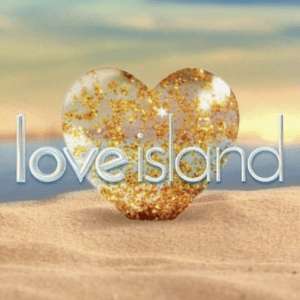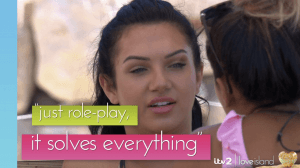By UCL Careers, on 24 July 2018
 [1]Remember that time we changed your lives with the three key career messages [2] we took from last year’s Love Island? Well, it was such a great idea, it brought us such a lot of professional respect, and it gave us such an excellent excuse to watch Love Island at work*, that we thought we’d do it again before this year’s show comes to an end:
[1]Remember that time we changed your lives with the three key career messages [2] we took from last year’s Love Island? Well, it was such a great idea, it brought us such a lot of professional respect, and it gave us such an excellent excuse to watch Love Island at work*, that we thought we’d do it again before this year’s show comes to an end:
1) Show me the evidence
If you transcribed all of Georgia’s Love Island communications, uploaded them into NVivo or Wordle, and created a word cloud, it would look something like the below:
 But did that convince us she was loyal or honest, babe? No. In fact, rather the opposite. It was her actions – staying true while Josh was in Casa Amor, leaving the villa with Sam – that eventually won us over.
But did that convince us she was loyal or honest, babe? No. In fact, rather the opposite. It was her actions – staying true while Josh was in Casa Amor, leaving the villa with Sam – that eventually won us over.  [3]Although some may not like to admit it, employers are no different to Love Island viewers. They need evidence to be convinced. So what can you do? Well, it’s wise to use employer language in applications. If your target employer has asked for leadership skills, explicitly tell them when you’re talking about leadership skills. It makes their job easier. But rather than simply declaring what a fantastic leader you are in your own opinion, why not provide examples of how you used your leadership skills, and what you achieved with them? This evidence-based approach will help you feel more comfortable promoting yourself, and the employer feel more comfortable believing you.
[3]Although some may not like to admit it, employers are no different to Love Island viewers. They need evidence to be convinced. So what can you do? Well, it’s wise to use employer language in applications. If your target employer has asked for leadership skills, explicitly tell them when you’re talking about leadership skills. It makes their job easier. But rather than simply declaring what a fantastic leader you are in your own opinion, why not provide examples of how you used your leadership skills, and what you achieved with them? This evidence-based approach will help you feel more comfortable promoting yourself, and the employer feel more comfortable believing you.
2) Negative experiences can be valuable

 [4]Laura, Laura, Laura. Our hearts have broken for you not once but twice. Should you regret your missteps? Should you lament moments spent with Wes and New Jack as wasted time? No! For through those relationships you learned what you do not want, and that allowed you to see what you dowant – a mature carpenter and model who has kissed Britney Spears – more clearly.
[4]Laura, Laura, Laura. Our hearts have broken for you not once but twice. Should you regret your missteps? Should you lament moments spent with Wes and New Jack as wasted time? No! For through those relationships you learned what you do not want, and that allowed you to see what you dowant – a mature carpenter and model who has kissed Britney Spears – more clearly.
When I speak to students and graduates about their past internship or placement experiences, they often view them as useful only if they turned out to be exactly the right role, with the right employer, for them. Of course that’s a wonderful result, but it’s not the only useful one. There is value in all of your past experiences as long as you take the time to reflect and draw it out. What was it you didn’t enjoy about a role? The task? The colleagues? The environment? And which elements did you enjoy? Exploring these questions is crucial in getting to know yourself, and deciding what your next step will be.
3) A little role play can help
 Oh hell, when surfer New Laura entered the house, Dr Alex made a real hash of the one relationship that seemed to be working for him. But he saved it by role playing a first meeting at a bar with Alexandra, and now they’re living happily ever after together**. Maybe a little role play can help you too. Interviews are a crucial part of an application process, but they’re a relatively unusual
Oh hell, when surfer New Laura entered the house, Dr Alex made a real hash of the one relationship that seemed to be working for him. But he saved it by role playing a first meeting at a bar with Alexandra, and now they’re living happily ever after together**. Maybe a little role play can help you too. Interviews are a crucial part of an application process, but they’re a relatively unusual
*If my boss is reading this then obviously I’m totally jokingscenario many people have limited experience with, especially in the earlier stages of their careers. So when you have an interview coming up, we advise getting as much practice as possible. Set up mock interviews with your friends and family, especially those who have knowledge of interviews and/or the field you’re entering. And book a mock interview with one of our careers consultants (if you are at UCL, or contact your own University Careers Office), who can help you role play in a safe setting, and then provide feedback to improve your performance for the real thing.
**Correct at time of writing.
Written by Sophia Donaldson, UCL Careers